#Bostock v. Clayton County
Text

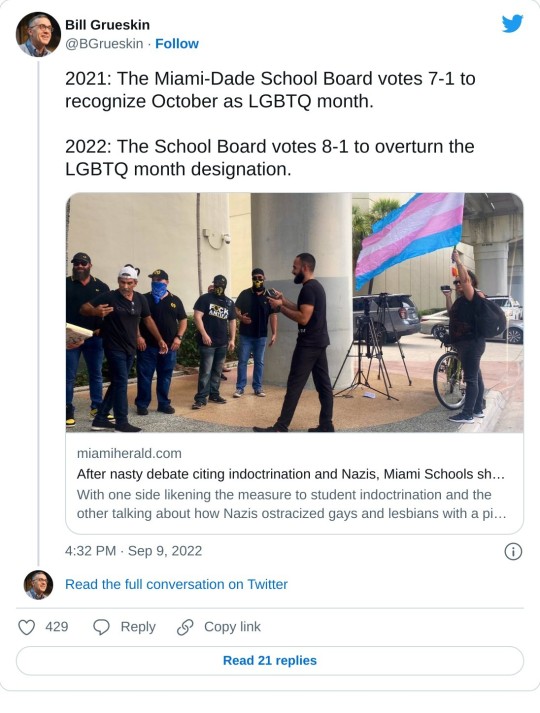
After debate citing indoctrination and Nazis, Miami-Dade School Board rejects LGBTQ month
After listening to more than three hours of angry debate, with one side likening the measure to student indoctrination and the other talking about how Nazis ostracized gays and lesbians with a pink triangle, the Miami-Dade School Board voted late Wednesday evening to slap down a measure recognizing October as Lesbian, Gay, Bisexual, Transgender and Queer History Month and teaching 12th graders about two landmark Supreme Court cases impacting the LGBTQ communities.
The vote was 8-1 with board member Lucia Baez Geller, who proffered the item, the only one voting for the measure.
The vote brought out droves of parents, teachers and students — along with a contingent of Proud Boys, who got in a loud argument with a person hoisting a trans flag outside the School Board headquarters at 1450 NE Second Ave. in downtown Miami. Throughout Wednesday, about 35 to 45 people stood in line in the afternoon sun outside the building, waiting to enter to make their comments known.
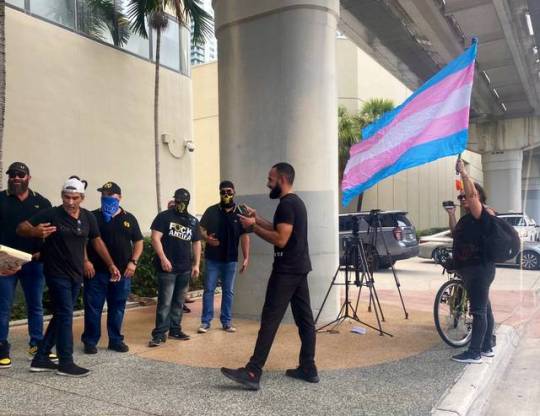
A person waving a transgender flag stands in front of a group of Proud Boys outside a contentious Miami-Dade School Board meeting discussing whether to recognize October as LGBTQ+ History Month in schools on Wednesday, Sept. 7, 2022, at the board’s headquarters in downtown Miami. Sommer Brugal [email protected]
“There is an election year and the anti-LGBTQ+ rhetoric is a tool used by some to spread misinformation,” said board member Lucia Baez Geller. “This is just plain disinformation.”
Baez Geller’s proposal called for recognizing October as Lesbian, Gay, Bisexual, Transgender and Queer (LGBTQ) History Month and teaching 12th graders about two Supreme Court landmark decisions — Obergefell v. Hodges in 2015 (recognizing same-sex marriage) and Bostock v. Clayton County in 2020 (finding an employer can’t fire someone for being gay or transgender).
The school district recognizes many months throughout the school year to teach students about history, whether it be about Hispanic heritage, Black history or women’s history. October is National LGBT History Month.
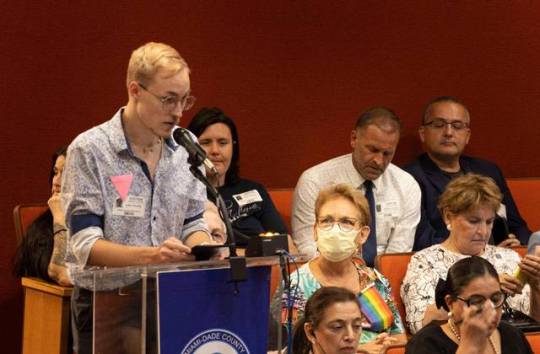
A woman looks up at Maxx Fenning while he speaks in support of the Miami-Dade School Board designating October as LGBTQ+ History Month. Fenning, president and founder of PRISM FL, a nonprofit organization that provides sexual health information to LGBTQ+ youth, wore a pink triangle as he likened opposition to the measure to how Nazis ostracized gay people, making them wear a pink triangle badge to reflect their sexual orientation. Alie Skowronski [email protected]
Ahead of Wednesday’s meeting, Baez Geller said the measure “is mostly to recognize the dignity and the respect for each other.” On Wednesday, she noted that 12th graders could opt out of learning about the two Supreme Court cases.
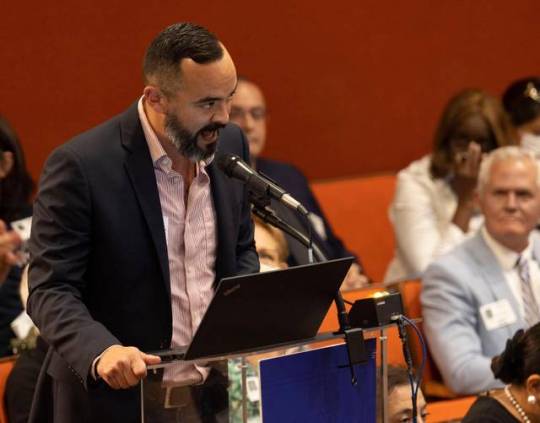
Alex Serrano, director of the Miami-Dade chapter of County Citizens Defending Freedom, speaks against recognizing LGBTQ History Month in October in Miami-Dade Public Schools at the School Board meeting on Wednesday, Sept. 7, 2022. The group fought the School Board over a sex-education textbook that the board first banned, then reinstated in a second vote. Serrano has no children in Miami-Dade Public Schools. He sends his children to Centner Academy, a Miami private school with a controversial anti-COVID-19 vaccination agenda. Alie Skowronski [email protected]
Last year, the Board voted 7-1 to recognize October as (LGBTQ) month, but last year’s measure did not include the provision to add the two Supreme Court cases to the 12th grade coursework.
Around 9:45 p.m. Wednesday, nearly six hours after the discussion first began — with a nearly one-hour break to hear about the district’s $7 billion budget in between — the Board finally voted. Those still in the audience cheered and clapped while others sat stoically after the 8-1 vote defeating the measure.
Before the vote, many who spoke in favor of the adoption, including numerous human rights organizations, argued a recognition would create a safe and reaffirming environment for students in the district. Many cited discrimination against the LGBTQ+ community and how many students struggle with mental health issues.
Maxx Fenning, president and founder of PRISM FL, a nonprofit organization that provides sexual health information to LGBTQ+ youth, likened those who wanted to block the measure to how Nazis ostracized gay people, making them wear a pink badge to reflect their sexual orientation.
“LGBTQ history is American history,’’ he said, noting if he were alive when the Nazis were in power, he would have been forced to wear the pink triangle badge that he wore on his shirt as he spoke.
Another man, who was a product of Miami-Dade Public Schools, urged the board members to pass the measure, noting he did not want students to feel the isolation that he did when he was a gay student in school decades ago.
“I can tell you as a gay child, I felt completely alone,’’ he said.
Those who opposed the measure said it went against their religious beliefs and that the board was abiding in the indoctrination and sexual abuse of children. Some, however, falsely claimed that the measure would adopt new curriculum for students to learn about LGBTQ+ issues. They said it was a gateway to speaking with students about LGBTQ+ topics without parental consent.
Max Tover, a pastor and parent in the district, led those outside in a prayer, asking that the board members reject the motion. In speaking to the Herald, he said passing the measure is “a Trojan Horse.” His friend, who wouldn’t provide his name, said talking about the law equates to child abuse.
During the public comment period, parent after parent who opposed the measure used the term “indoctrination” when speaking against the measure, saying it was parents’ right to decide whether to teach their children about gay and lesbian rights, not teachers in public schools.
Baez Geller countered that the measure did not indoctrinate students nor did it take away parental choice, as many who opposed the measure cited the recently passed “Parental Rights in Education” law, which prohibits instruction related to gender identity or sexual orientation in kindergarten through third grade. Those opposed to the law say it could potentially restrict such instruction for older kids and have called it the “Don’t Say Gay” bill.
Baez Geller reiterated that parents could opt out of the 12th-grade lessons on the Supreme Court cases, but noted that students already learn about other Supreme Court cases that have become the law of the land, and these two cases are no different, she said.
Shortly before the vote, Andrea S. Pita Mendez, the board’s student adviser, spoke in favor of the item, despite feeling scared to share how she felt and what she believed in after listening to the multiple hours of public comment. Nevertheless, she said, she was elected by her peers to represent the student body, which she said supported the item.
Moreover, she said, she disagreed with board member Lubby Navarro’s comments claiming parents were the district’s clients. Instead, she argued, students were the district’s clients.
#us politics#2022#twitter#tweet#parker molloy#miami herald#Florida#don't say gay bill#gov. ron desantis#obergefell v. hodges#us supreme court#scotus#us history#@BGrueskin#Bostock v. Clayton County#proud boys#lgbtqia+#lgbtqia+ rights#lgbtqia+ representation#republican homophobia#homophobia#lgbtqia+ month#lgbtqia+ pride#Maxx Fenning#PRISM FL#Baez Geller#parental rights in education#Andrea S. Pita Mendez
130 notes
·
View notes
Text
The Supreme Court on Tuesday declined to hear an appeal from a Christian college in Missouri that sued the Biden administration over its decision to shield transgender people from housing discrimination.
At issue was a 2021 memo from the Department of Housing and Urban Development that interpreted a federal anti-discrimination law as protecting transgender individuals. The College of the Ozarks claimed that the guidance conflicted with its ability to make housing assignments for students on the basis of sex assigned at birth.
"College of the Ozarks brought this challenge for one reason: The Biden administration was attempting to force them to open their dormitories to members of the opposite sex," said Alliance Defending Freedom senior counsel Julie Marie Blake. "Though the high court chose not to review this case, we are hopeful it will soon take up related cases....College of the Ozarks will continue to follow its beliefs."
Lower courts, including the St. Louis-based U.S. Court of Appeals for the 8th Circuit, sided with the Biden administration on a procedural point last year, finding that the college did not have standing to sue, in part, because the government never attempted to enforce an anti-discrimination complaint against the school.
The 2021 guidance, the Biden administration told the Supreme Court in its written response in late May, does not by itself require the school "or any other housing provider to do or refrain from doing anything." The college, the administration said, "has not alleged any past, current, or threatened enforcement."
The Biden administration's memo was the result of a significant 2020 Supreme Court decision that bars discrimination in the workplace based on sexual orientation and gender identity. The ruling in Bostock v. Clayton County focused on Title VII of the Civil Rights Act of 1964, which explicitly prohibits workplace discrimination based on race, color, national origin, sex and religion. A majority of the court held that sexual orientation and gender identity necessarily involve a person's sex. Because of that, they reasoned, the law prohibits LGBTQ+ discrimination.
The anti-discrimination housing provision of the Fair Housing Act uses language that is similar to what's in the workplace law, including an explicit prohibition of discrimination on the basis of sex.
#us politics#news#usa today#2023#us supreme court#SCOTUS#Biden administration#trans rights#trans#transgender#transgender rights#Department of Housing and Urban Development#College of the Ozarks#Julie Marie Blake#U.S. Court of Appeals for the 8th Circuit#Civil Rights Act of 1964#title vii#Bostock v. Clayton County#Fair Housing Act#anti-discrimination laws#lgbtqia+ rights#lgbtqia+
13 notes
·
View notes
Text
Even Best Friends Sometimes Disagree
Supreme Court Justices voting practices are fairly predictable. For instance, most decisions are unanimous. Since the longest serving justice on the Court, Justice Thomas joined the Court in 1991 42.65% of argued cases have returned unanimous votes. The Court also tends to reverse lower court decisions. The justices voted to reverse the lower court decision in 65.58% of decisions during the…
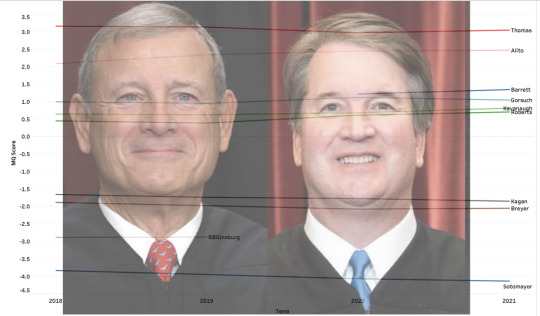
View On WordPress
#Apple v. Pepper#Borden v. United States#Bostock v. Clayton County#Concepcion v. United States#Cruz v. Arizona#Department of Commerce v. New York#Dept. of Homeland Security v. Regents of the University of California#Helix Energy v. Hewitt#Iancu v. Brunetti#June Medical v. Russo#Justice Kavanaugh#Justice Roberts#Ramos v. Louisiana#Stokeling v. United States#United States v. Davis#United States v. Haymond#Uzuegbunam v. Preczewski#Van Buren v. United States#Virginia Uranium v. Warren
0 notes
Note
if they make same sex sex illegal again what would happen?
hypothetically i think it would probably look like allowing the states the ability to make gay sex illegal which would mean ppl being able to report anyone they suspect to be engaging in gay acts to the police and the police being able to target ppl on suspicion of being gay & allowing the return of police raids on places like gay bars & stuff. that being said i REALLY don’t see lawrence being overturned just for the fact that it’s unlikely a case would get up to the supreme court for that. are there lawmakers that would love to outlaw gay sex just to bring a law up to the courts to overturn lawrence? i’m sure there is. however the court has already REALLY taken a hit to its legitimacy at this point which is the only power it actually has & i can’t see them jumping to make another controversial decision like that any time soon. perhaps it could happen in a few yrs from now or smth but whereas abortion is a highly contested topic homosexuality is at this point spans neutral to positive in general public opinion & would be an even bigger hit to the court’s legitimacy since even moderates & some conservatives would agree that it’s wrong to ban homosexuality entirely whereas abortion is WAY more of a cut and dry political split (meaning less of a hit to their legitimacy since conservatives are loving them rn). the court isn’t really going to make a huge political decision that will be polarizing to a majority of the public despite what thomas might want. i think even if someone tried to bring a case up they wouldn’t take it or if they did they’d alter lawrence & legalize it based on the equal protection clause rather than privacy. but that is just my opinion based on my undergrad studies being p focused on con law (including the court’s behavior) lol
#obviously homophobia is still a huge issue BUT. public opinion generally is that gay ppl should like. b allowed to exist lol.#given that i don’t think the court would make a decision banning homosexuality bc even ppl that r like. not the biggest fan of gay ppl#would generally b like it’s wrong to ban it entirely. so it wouldn’t be desirable for the court to go for lawrence#i just don’t think banning gay sex is the hill the court is going to want to die on. like i don’t think all of the conservative justices#would b on board enough for that. also i think roberts who is obsessed w the court’s legitimacy#would probably get a baseball bat out and start swinging or smth if they even BREATHED in the direction of a case for that#don’t get me wrong alito would b! but gorsuch (HIGHLY conservative) even wrote the majority for bostock v clayton county which was HUGE#for stopping discrimination against lgbt ppl in the workplace so. i REALLY don’t see it happening#gay marriage is a different issue entirely though i could way more likely see that being overturned. lawrence i do not.#anonymous#ask //
8 notes
·
View notes
Text
Detransitioner news
I have been thinking about detransitioners lately and wanted to compile articles I have been seeing. This will be a longer post and reblogged for part II as I hope to copy and paste brief portions of the articles under each headline.
Law firm for detransitioners opens in Dallas

In all of the controversy around gender transition, there is one group that is persistently marginalized by both the right and left.
They are known as detransitioners — people who decide that they want to return to their birth gender, often after receiving years of interventional care, including surgery, to treat their gender dysphoria.
Now, the nation’s first law firm focused solely on representing these patients — many of whom feel abused by a medical system that encouraged their treatment — has opened its doors in Dallas.
It could forever change how hospitals and doctors approach what’s known as gender-affirming care.
Archive link
Fenway Community Health Center in Boston, the largest provider of transgender medicine in New England and one of the leading institutions of its kind in the United States, was named a defendant in a lawsuit filed last month. The plaintiff, a gay man who goes by the alias Shape Shifter, argues that by approving him for hormones and surgeries, Fenway Health subjected him to “gay conversion” practices, in violation of his civil rights. Carlan v. Fenway Community Health Center is the first lawsuit in the United States to argue that “gender-affirming care” can be a form of anti-gay discrimination.
The case underscores an important clinical reality: gender dysphoria has multiple developmental pathways, and many who experience it will turn out to be gay. Even the Endocrine Society concedes that many of the youth who outgrow their dysphoria by adolescence later identify as gay or bisexual. Decades of research confirm as much. Gender clinicians in the U.K. used to have a “dark joke . . . that there would be no gay people left at the rate [the Gender Identity Development Service] was going,” former BBC journalist Hannah Barnes reported. Rather than help young gay people to accept their bodies and their sexuality, what if “gender-affirming” clinicians are putting them on a pathway to irreversible harm?
Due partly to Shape’s lifelong difficulty in accepting himself as gay, his lawyers are not taking the usual approach to detransition litigation. Rather than state a straightforward claim of medical malpractice or fraud, they allege that Fenway Health has violated Section 1557 of the Affordable Care Act (ACA), which bans discrimination “on the basis of sex” in health care. In 2020, the Supreme Court ruled in Bostock v. Clayton County that “discrimination because of . . . sex” includes discrimination based on homosexuality. Citing this and other precedents, Shape’s lawyers argue that federal law affords distinct protections to gay men and lesbians—upon which clinics that operate with a transgender bias are trampling.
Shape grew up in a Muslim country in Eastern Europe that he describes in an interview as “very traditional” and “homophobic.” His parents disapproved of his effeminate demeanor and interests as a child. They wouldn’t let him play with dolls, and his mother, he says, made him do stretches so that he would grow taller and appear more masculine.
At 11, Shape had his first of several sexual encounters with older men. “I was definitely groomed,” he recounts. Shape proceeded to develop a pattern of risky sexual behavior, according to his legal complaint. He told his medical team at Fenway Health about his childhood sexual experiences, calling them “consensual.” The Fenway providers never challenged him on this interpretation, he alleges. They never suggested that he might have experienced sexual trauma or, say, explored how these events might have shaped his feelings of dissociation. (The irony is that Fenway Health describes its model of care as “trauma-informed.”)
Archive link
Ontario detransitioner who had breasts and womb removed sues doctors
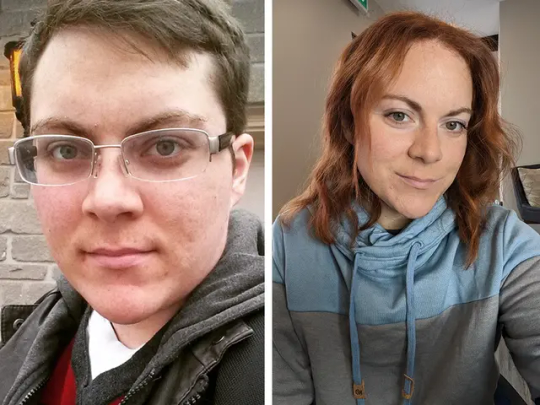
An Ontario detransitioning woman who had her breasts and womb removed to change her gender to male is suing medical and health practitioners for failing to consider other treatments during her mental health crisis before ushering her on an irreversible journey she regrets.
Michelle Zacchigna, 34, of Orillia, Ont., north of Toronto, names eight health professionals, including doctors, psychologists, a psychotherapist and a counsellor in a lawsuit filed in Ottawa.
None of the defendants, who work or worked at various clinics and institutions in southern Ontario, responded to requests for comment on the lawsuit prior to deadline. Four of the defendants have filed notices of intent to defend against the suit in Ontario Superior Court, but no statements of defense have been filed. None of the claims have been tested in court.
Zacchigna said she faces an uphill battle in her lawsuit.
“I’ve been under the impression that all medical malpractice suits are challenging. Doctors win the majority of cases in Canada,” she told National Post.
“It’s very much a David vs. Goliath undertaking.”
In her statement of claim filed in court in November, Zacchigna says she had difficulty forming relationships with classmates in elementary school and was often bullied.
By the time she was 11, she engaged in self-harming behaviour, including cutting her arm with a knife. This continued into early adulthood.
When she was 20, she tried to kill herself and she was referred by her family doctor for psychotherapy, where she was treated for social anxiety and clinical depression.
She remained unhappy and depressed, and her mental health decline led to her dropping out of university, according to her claim.
About a year into therapy, she engaged with an online community around gender nonconformity.
“Michelle came to believe that her biological sex of female did not match her true gender identity of male,” her claim says.
“She further came to believe that this mismatch between her biological sex and gender identity was causing her feelings of depression, self-harming behaviour and unease in her body, a mental health condition commonly known as gender dysphoria,” her claim states.
This was the first time Zacchigna felt she was born in the wrong body, and she had not previously identified as male, her claim says.
“However, as a result of what she read on the internet, she became convinced that she was a transgender man, and that once she embraced this new identity, her depression would subside.”
Zacchigna started attending a support group in Toronto for people considering gender transition. A counsellor there told her of opportunities to proceed through a medical transition, her claim says.
Zacchigna was invited to apply for medical intervention in 2010.
The counsellor wrote a recommendation letter outlining a medical history that didn’t fully match her real past, the claim says. The counsellor didn’t recommend any alternatives, or seek confirmation of Zacchigna’s own diagnosis of gender dysphoria.
Her regular therapist also wrote a recommendation for transition treatment, saying Zacchigna was an “ideal candidate for hormone therapy,” even though the therapist had no previous transgender clients, according to the claim.
Part II incoming.
#detrans#detransition#desist#ftm detransition#mtf detransition#LGB#gender critical#gender critical feminism#gender ideology
75 notes
·
View notes
Text

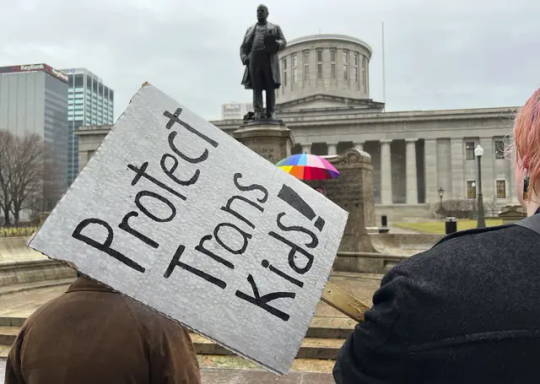
The Biden administration issued new rules on Friday cementing protections for L.G.B.T.Q. students under federal law and reversing a number of Trump-era policies that dictated how schools should respond to cases of alleged sexual misconduct in K-12 schools and college campuses.
The new rules, which take effect on Aug. 1, effectively broadened the scope of Title IX, the 1972 law prohibiting sex discrimination in educational programs that receive federal funding. They extend the law’s reach to prohibit discrimination and harassment based on sexual orientation and gender identity, and widen the range of sexual harassment complaints that schools will be responsible for investigating.
[...]
Through the new regulations, the administration moved to include students in its interpretation of Bostock v. Clayton County, the landmark 2020 Supreme Court case in which the court ruled that the Civil Rights Act of 1964 protects gay and transgender workers from workplace discrimination. The Trump administration held that transgender students were not protected under federal laws, including after the Bostock ruling.
Source: NY Times (April 19 2024)
31 notes
·
View notes
Text
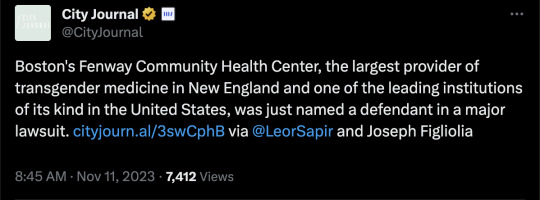

By: Leor Sapir, Joseph Figliolia
Published: Nov 8, 2023
Fenway Community Health Center in Boston, the largest provider of transgender medicine in New England and one of the leading institutions of its kind in the United States, was named a defendant in a lawsuit filed last month. The plaintiff, a gay man who goes by the alias Shape Shifter, argues that by approving him for hormones and surgeries, Fenway Health subjected him to “gay conversion” practices, in violation of his civil rights. Carlan v. Fenway Community Health Center is the first lawsuit in the United States to argue that “gender-affirming care” can be a form of anti-gay discrimination.
The case underscores an important clinical reality: gender dysphoria has multiple developmental pathways, and many who experience it will turn out to be gay. Even the Endocrine Society concedes that many of the youth who outgrow their dysphoria by adolescence later identify as gay or bisexual. Decades of research confirm as much. Gender clinicians in the U.K. used to have a “dark joke . . . that there would be no gay people left at the rate [the Gender Identity Development Service] was going,” former BBC journalist Hannah Barnes reported. Rather than help young gay people to accept their bodies and their sexuality, what if “gender-affirming” clinicians are putting them on a pathway to irreversible harm?
Due partly to Shape’s lifelong difficulty in accepting himself as gay, his lawyers are not taking the usual approach to detransition litigation. Rather than state a straightforward claim of medical malpractice or fraud, they allege that Fenway Health has violated Section 1557 of the Affordable Care Act (ACA), which bans discrimination “on the basis of sex” in health care. In 2020, the Supreme Court ruled in Bostock v. Clayton County that “discrimination because of . . . sex” includes discrimination based on homosexuality. Citing this and other precedents, Shape’s lawyers argue that federal law affords distinct protections to gay men and lesbians—upon which clinics that operate with a transgender bias are trampling.
Shape grew up in a Muslim country in Eastern Europe that he describes in an interview as “very traditional” and “homophobic.” His parents disapproved of his effeminate demeanor and interests as a child. They wouldn’t let him play with dolls, and his mother, he says, made him do stretches so that he would grow taller and appear more masculine.
At 11, Shape had his first of several sexual encounters with older men. “I was definitely groomed,” he recounts. Shape proceeded to develop a pattern of risky sexual behavior, according to his legal complaint. He told his medical team at Fenway Health about his childhood sexual experiences, calling them “consensual.” The Fenway providers never challenged him on this interpretation, he alleges. They never suggested that he might have experienced sexual trauma or, say, explored how these events might have shaped his feelings of dissociation. (The irony is that Fenway Health describes its model of care as “trauma-informed.”)
As with the social environment they inhabited, Shape’s parents were “deeply homophobic,” he says. When Shape came out to his parents as gay at 15, they took him to a therapist, hoping that he would be “fixed.” But when he graduated high school at that same age, he moved to Bulgaria for college, and in 2007, at 17, he came to the United States for a summer program at the University of North Carolina. He later moved to Massachusetts to pursue an MBA at Clark University and immigrated to the U.S.
Though he had known about cross-dressers and transsexuals as a child (he had taken interest in Dana International, the famous Israeli transsexual who won the Eurovision Song Contest in 1998), it was only at Clark that he was introduced to the idea that some people are transgender. Other students began asking him about his pronouns and telling him about “gender identity.” After getting to know a “non-binary” person and a transgender woman, Shape started to make sense of his life retrospectively. As a boy going through puberty, he had developed larger-than-average breasts and was curvier than the other boys. It was hard for him to be accepted in the gay community, he told me, because gay men tend to value masculinity. His discomfort with social expectations about how men are supposed to look and behave, his sexual attraction to other men, his ongoing psychological and emotional distress: these were all signs, he learned from online forums, that he must have been “born in the wrong body.”
Shape quickly developed self-hatred and a strong desire to escape his body. When he started cross-dressing and presenting socially as a woman, things changed. It had been hard for him to win acceptance as an effeminate gay man, but he encountered far less hostility presenting as a woman. A subtle but important shift in his thinking took place.
“People wouldn’t take me seriously when I was a man who presented socially as a woman,” he says. “I had to actually be a woman.” Shape became immersed in online transgender culture, which told him that sex is a social construct, and that hormones and surgeries can actually turn him into a woman. As a result, Shape developed highly unrealistic expectations about what hormones and surgeries could do for him. An example noted in his legal filing: he stopped using condoms because he wanted to get pregnant.
Julie Thompson, a physician assistant and Medical Director of the Trans Health Program at Fenway Health, made no effort to perform differential diagnosis on Shape, his legal filing alleges. Shape told Thompson about his childhood sexual encounters, his troubled history of risky sexual activity, and his struggles with social and familial rejection on account of his homosexuality. Allegedly, she wrote these difficulties off as byproducts of society not accepting him as a “trans woman”—an approach known as “transgender minority stress.” Shape’s ongoing mental-health problems, it was determined, were due to “internalized transphobia.”
As Shape’s filing puts it, the Fenway clinic operated with a strong “transgender bias.” Every problem or counter-indication that came up was explained away as part of the stress that transgender people experience in an unwelcoming society. The clinicians at Fenway Health apparently assumed that sexual orientation and gender identity are two distinct and independent phenomena.
Shape was put on estrogen at age 23. According to his filing, he was not given “any explanation of the numerous potential adverse side effects of estrogen or its potentially unknown effects.” As Shape kept taking estrogen, he became even more emotional, depressed, and unstable. Notably, he did not dislike his male genitals—a fact that should have attracted more scrutiny from his clinicians—but seemed more distressed over his high sex drive and desire for intercourse with men. Though he says he frequently told his providers that he hoped “sex reassignment surgery” would reduce his sex drive, this statement did not cause them to reconsider whether estrogen was appropriate.
As the Fenway team allegedly saw it, Shape’s deterioration was evidence that he hadn’t gone far enough in his transition. They recommended that he attend First Event, a Boston-based conference held annually since 1980, where transgender people can meet one another, share ideas, interact with vendors, and find medical providers who will agree to perform procedures on them. Marci Bowers, the genital surgeon who is president of the World Professional Association for Transgender Health, has attended the conference in the past. According to Shape, the point of going to First Event was to find a surgeon who would operate on him.
He did just that, and in 2014, at 24, Shape underwent facial feminization surgery and breast implantation. Less than a year later, a surgeon surgically castrated him and conducted what’s euphemistically called “bottom surgery.” It didn’t work. As a result, Shape had to undergo several additional surgeries, the last one borrowing tissue from his colon. Still, the problems persisted.
It took Shape a few years to realize that he had made a terrible mistake. The problem he had been trying to solve all his life was not “internalized transphobia” but failure to accept himself as an effeminate gay man. His legal filing states that he had what the Diagnostic and Statistical Manual of Mental Disorders called, at the time he made contact with the clinic, “ego-dystonic homosexuality.” Because they failed to detect this and other mental-health problems, the Fenway team, argue Shape’s lawyers, “outrageously, knowingly, recklessly, and callously” led him to believe that he was really a heterosexual woman whose problems could be solved by de-sexing himself as male.
Shape was promised “gender euphoria.” Instead, he told me that he now sees himself as “mutilated.” His treatments have left him with “osteoporosis and scoliosis” as well as “mental fog,” according to his legal filing. Shape is now “faced with the impossible choice of improving his cognitive state and suffering the psychological and physical effect of phantom penis, or taking estrogen and suffering mental fog and fatigue, but no phantom penis and low libido.” He has also endured fistulas as a complication of his genital surgery and “suffers from sexual dysfunction and is unable to enjoy sexual relations.” He experiences dangerous inflammation. And not getting the mental health therapy he needed very likely caused Shape’s mental health to deteriorate throughout the several years that he was a patient at Fenway Health.
Shape now wants to have his breast implants removed. But insurance does not cover the procedure because it is not technically “gender affirming.” And since he cannot afford the hefty price tag, Shape has no choice but to live with the implants.
Understandably, criticism of gender medicine has focused largely on its use in minors. Its use in adults, however, is not without controversy. In the past, when clinicians spoke of adult transgender medicine, they were referring mainly to adult men who sought to change their bodies in their forties. Many had already spent years in marriage and were fathers of children.
That is no longer the case. Though data are limited, the main patient demographic in adult transgender clinics today appear to be 18-24-year-olds. In Finland, for example, adult referrals rose approximately 750 percent between 2010 and 2018, with 70 percent of referrals being 18-22-year-olds.
Humans reach full cognitive maturity around age 25, which means that there is often little to distinguish a 20-year-old from a 17-year-old in terms of impulse control, emotional self-regulation, and the ability to set long-term goals and prioritize them over present desires. Citing “irrefutable evidence” that being under 25 means having “diminished capacity to comprehend the risk and consequences of [one’s] actions,” the progressive decarceration and racial-justice advocacy group The Sentencing Project argues that the idea that people are adults once they reach age 18 “is flawed.”
Shortly after its founding in 1971, Fenway Community Health Center was repurposed to support the unique needs of gay and lesbian residents of Boston. According to Katie Batza, a historian of the clinic, the hippies and antiwar activists who founded Fenway Health “quickly solidified its reputation as an important gay medical institution.” During the 1980s, the clinic helped tackle the AIDS epidemic. That it now maltreats gay men like Shape by converting them into trans women reflects a tectonic shift within the institution’s culture.
American medicine has always found itself balancing two competing tendencies: the paternalism of care by experts on one hand, and the relativism of nonjudgmental customer service on the other. What has happened over the course of Fenway Health’s five decades of existence is a gradual loss of that equilibrium. Fenway has long defined its mission in terms of responsiveness to the stated needs and desires of community members: the volunteers who ran the clinic and offered its services free of charge, Batza writes, “focused on providing care and building community among Fenway residents, caring less if a volunteer met outside standards of professional qualification, which were often set by the state or medical profession, that the clinic critiqued.”
In the 1990s, the clinic set up a dedicated transgender unit. At first, “things moved slowly,” recounts Marcy Gelman, a nurse practitioner who served as Fenway Health’s first dedicated provider for transgender patients, in a document published by the institute about the history of its program. She is now its associate director of clinical research. “Patients didn’t get hormones right away. We wanted to get to know them, and required them to see a therapist for several months . . . we wanted to be careful.” This process felt too restrictive for some patients, and “a few got really angry.” Fenway Health says its “commitment to ensure patient safety . . . led to some conflicts with patients and community members.”
In the 2000s, Fenway Health adopted a new model of care for its transgender-identified patients, which it called the “informed consent model.” This came in response to patients complaining about “needless gatekeeping” and concerns that the clinic’s “customer service training specific to transgender patients lagged behind the development of its clinical care.” Using funding from the Blue Cross/Blue Shield Foundation, Fenway Health made a number of new hires and expanded its program. It drew inspiration from another community health clinic, the Mazzoni Center in Philadelphia, which was smaller than Fenway but served four times as many patients. “One key to [the Mazzoni Center’s] success,” the Fenway document explains, “was the elimination of any requirement for counseling before hormones were provided.” Ruben Hopwood, a physician who joined the Fenway team in 2005, developed this model for Fenway; soon thereafter, the institution’s three-month counseling requirement gave way to “a single hormone readiness assessment visit.”
In 2012, the World Professional Association for Transgender Health published the seventh version of its Standards of Care. In the chapter on hormone therapy, WPATH recommended eligibility criteria for estrogen or testosterone, including “persistent, and well-documented gender dysphoria” and having ongoing “medical or mental health concerns . . . reasonably well-controlled.” However, WPATH also noted a newly emerging “informed consent model” and cited Fenway Health as one of three clinics that developed and practiced it.
The difference between the models, WPATH explained, was that SOC-7 put “greater emphasis on the important role that mental health professionals can play in alleviating gender dysphoria and facilitating changes in gender role and psychosocial adjustment. This may include a comprehensive mental health assessment and psychotherapy, when indicated.” By contrast, Fenway Health’s model emphasizes “obtaining informed consent as the threshold for the initiation of hormone therapy in a multidisciplinary, harm-reduction environment. Less emphasis is placed on the provision of mental-health care until the patient requests it, unless significant mental health concerns are identified that would need to be addressed before hormone prescription.” Despite the obvious differences, WPATH insisted the two models were “consistent” with each other.
Currently, Fenway Health offers hormones on the informed-consent model. “Criteria for accessing hormone therapy,” it states, “are informed by the WPATH (World Professional Association for Transgender Health) guidelines.” In other words, Fenway Health defers to WPATH, which adopted its recommendations from Fenway Health.
Shape and his lawyers deny that Fenway’s informed consent process is “a safe and effective replacement for assessment, diagnosis, and treatment provided by an appropriately trained and licensed healthcare professional.” Fenway’s model, they argue, “relies heavily on patients’ self-diagnosis, which may be a result of confusion or a misunderstanding of medically defined terms.” It does not take into account a patient’s expectations from medical treatment, which, as in Shape’s case, can be highly unrealistic. It “does not inform patients about the risk of iatrogenic effects of affirmation.” Nor does it take into account a patient’s “medical decision-making capacity,” which may be impaired in the presence of “significant emotional distress” and “undue influence from persons in position of authority and trust.”
A key charge in Shape’s lawsuit is that Fenway Health is driven by “market expansion goals and political demands of transgender activists.” Approval for hormones and surgery, the clinic’s staff wrote in 2015, should be a “routine part of primary care service delivery, not a psychological or psychiatric condition in need of treatment.” A leading advocate for the no-gatekeeping model, which rests on the assumption that mismatch between one’s actual and perceived sex is a normal human variation and not a pathological condition, argues that adults and adolescents should be free to turn their bodies into “gendered art pieces.”
From Shape’s story, we can infer that Fenway Health, which could not be reached for comment, has yielded to a barely constrained medical consumerism. In 1997, the institute had eight transgender customers. By 2015, it had over 1,700. “The rapid and sustained growth of Fenway Health’s transgender health care, research, education, training, and advocacy,” the institute’s doctors proudly declare, “might be succinctly summarized by the mantra from the movie Field of Dreams: If you build it, they will come.”
==
If you haven't met Shape Shifter, see the following interviews:
youtube
youtube
Literally "trans the gay away."
#Shape Shifter#Leor Sapir#Joseph Figliolia#Fenway Community Health Center#medical transition#gender ideology#queer theory#genderwang#medical malpractice#medical scandal#trans the gay away#trans away the gay#woke homophobia#homophobia 2.0#gay conversion therapy#conversion therapy#gender affirming care#gender affirmation#affirmation model#medical corruption#informed consent#bottom surgery#vaginoplasty#minority stress#religion is a mental illness#Youtube
15 notes
·
View notes
Text
Hi! This isn’t legal advice
So the U.S. Department of Education has a proposed rule out right now (ID number ED-2021-OCR-0166-0001) which, among other things, clarifies that the Department will interpret discrimination “on the basis of sex” as including discrimination based on sexual orientation and gender identity. Obviously I’m in favor of that happening, and I would encourage other people that are to leave a comment on the proposed rule.
The Department is a federal agency, meaning a section of the executive branch that has been delegated rule-making authority by Congress. Part of their rule-making process is publishing a proposed rule and then having a comment period where the public gets to weigh in. You can read more about notice and comment rule-making here.
I left a comment myself last week, and I’ve also looked through a fair amount of the comments currently published. Unfortunately, most of them seem to be conservative folks using a template to express their displeasure at the idea of federal protection for LGBT students.
I do want to reassure y’all by saying that even if that remains the case, notice and comment rule-making isn’t a vote; the agency is required to read and consider the comments, but a high volume of non-support doesn’t mean they can’t make their proposed rule official. You should leave a commend regardless, because this is an excellent way to support LGBT students and the sections of the American government that are trying to protect them. You don’t have to be American to leave a comment, and there is an option to leave an anonymous comment.
Really all the Department is doing here is adopting the interpretation of “on the basis of sex” that the Supreme Court made law for Title VII (employment law) purposes in a 2020 case called Bostock v. Clayton County. In Bostock, SCOTUS said yes, discrimination on the basis of sex includes discrimination on the basis of sexual orientation and gender identity. The Department of Education deals with Title IX, a different federal statute with the same language: on the basis of sex.
Statutory interpretation isn’t an exact science, but the general rule is that if you have the same language in two different federal statutes, that language should be interpreted the same way. So if SCOTUS says the language in Title VII protects LGBT employees, that would mean that the same phrase in Title IX protects LGBT students. I don’t view this as legally controversial at all, though it is, very obviously, politically controversial.
To leave a good, useful comment you would want to (1) not use a template and (2) give the Department facts to support the proposed rule. It might be a good idea to mention Bostock, for example, or describe any personal experiences you might have of discrimination on the basis of sexual orientation/gender identity within the American education system-- but for the love of God remember not to out anyone in a publicly accessible comment. You could also cite studies about LGBT discrimination, or similar statistics.
It doesn’t have to be long or professional. Thank y’all for your time and effort.
-C
#ampol#lets be honest this was already deeply personal for me but#it became more so this sunday when I had to leave mass halfway through an angry homily about it#no I won't be going back to that parish no I'm not feeling particularly okay about it#but so it goes on this bitch of an earth huh#just do me a solid on this one please#not comics sorry
239 notes
·
View notes
Text
turns out that there are a very large number of people on r/jobs who are lowkey or raging transphobes. I got downvoted to oblivion on that sub for suggesting that people treat their trans and non-binary colleagues in their workplaces with the basic ass respect of calling them by their correct names and pronouns. I also pointed out that under Title VII, the EEOC and the decision handed down in Bostock v. Clayton County employment discrimination based on actual or perceived sex, gender or sexual orientation is illegal. Apparently these redditors were deeply offended by this, because so many of them came at me telling me that I'm the problem or whatever, which lmaooo, die mad.
I and the small handful of other commenters on this post who pointed out that misgendering is bad and that you shouldn't misgender people all got downvoted to shit, while the users who proudly proclaimed that they made discriminatory employment decisions or deliberately misgendered their colleagues got super upvoted. Fuck the people of r/jobs actually. I think it's time for me to unsub from that shithole of a sub. Sad that such a large and general sub is so full of weird transphobes.
Some real gems (that got super upvoted) in response to my comments:
u/[redacted]: You sound exhausting. Nobody will want to hire you.
u/[redacted]: You seem like the type to be offended by everything.
u/[redacted]: Thanks for providing a perfect example of why people with different pronoun would be a problem in the workplace.
4 notes
·
View notes
Text
Justice Samuel Alito is evidentially toting around an old grudge.
At a Thursday night event at the Antonin Scalia Law School at George Mason University, he had harsh words for the two conservative justices who joined the majority in Bostock v. Clayton County.
The 2020 opinion said that the Civil Rights Act of 1964, which prohibits sex-based discrimination, extends to gay and transgender workers. Justice Neil Gorsuch wrote the majority opinion, in which he was joined by the liberals and Chief Justice John Roberts.
Speaking via a video feed Thursday, Alito called Gorsuch a “colleague and friend,” but said that grounding the decision in the text of the 1964 law was “in my view indefensible,” according to the Washington Post.
“It is inconceivable that either Congress or voters in 1964 understood discrimination because of sex to mean discrimination because of sexual orientation, much less gender identity,” Alito said. “If Title VII had been understood at that time to mean what Bostock held it to mean, the prohibition on discrimination because of sex would never have been enacted. In fact, it might not have gotten a single vote in Congress.”
His disdain for the opinion has long simmered.
“The Court’s opinion is like a pirate ship,” he wrote in his dissent. “It sails under a textualist flag, but what it actually represents is a theory of statutory interpretation that Justice Scalia excoriated — the theory that courts should ‘update’ old statutes so that they better reflect the current values of society.”
Alito wasn’t the only conservative enraged by the decision, and by Gorsuch and Roberts’ defections.
“All those evangelicals who sided with Trump in 2016 to protect them from the cultural currents, just found their excuse to stay home in 2020 thank to Trump’s Supreme Court picks,” seethed conservative radio host Erick Erickson on Twitter.
“Justice Scalia would be disappointed that his successor has bungled textualism so badly today, for the sake of appealing to college campuses and editorial boards. This was not judging, this was legislating — a brute force attack on our constitutional system,” bemoaned Carrie Severino, president of the right-wing Judicial Crisis Network.
While Alito was relitigating the old disagreement, protesters were posted up outside of the event to either celebrate or condemn a much fresher battleground: the Justice’s leaked draft majority opinion overturning Roe v. Wade.
#us politics#news#us supreme court#scotus#justice samuel alito#Bostock v. Clayton County#Civil Rights Act of 1964#lgbtqia+ rights#lgbtqia+#Justice Neil Gorsuch#justice john roberts#chief justice john roberts#the washington post#2020#2022#talking points memo
22 notes
·
View notes
Text
Roberts Court Jurisprudence: What Was and What Will Come
What is the Supreme Court’s most important work? Although peoples’ answers may vary, one of the Court’s most important outputs is its opinion language. Through its precedent, the Court develops standards for people to follow and for lower courts to articulate in subsequent decisions. Precedent guides decision making from the top down and affects outcomes for millions of individuals. What cases…

View On WordPress
#Adams by and through Kasper v. School Board of St. Johns County#Anderson v. Liberty Lobby#Beckles v. United States#Biestek v. Berryhill#Bostock v. Clayton County#Brnovich v. DNC#Celotex v. Catrett#Espinoza v. Montana Department of Revenue#FEC v. Cruz#Harrington v. Richter#Hughes v. United States#Iqbal#Johnson v. United States#Jones v. Bock#June Medical v. Russo#Kingsley v. Hendrickson#Matrixx Initiatives#Ramos v. Louisiana#Spokeo v. Robins#TransUnion LLC v. Ramirez#Twombly#United States v. Booker#West Virginia v. EPA
0 notes
Text
Erin Reed at Erin In The Morning:
Yesterday, during a meeting with the Young Conservatives of Texas, Gov. Greg Abbott stated that trans and gender nonconforming (GNC) teachers must be "ended" in the state. This statement follows crackdowns on transgender teachers in various Republican-controlled states in the United States. Book bans, "Don't Say Gay" legislation, and anti-drag laws have increasingly been weaponized against all transgender and GNC individuals, especially within educational settings. In Texas, many of these laws have been blocked due to being likely unconstitutional; however, this has not prevented the governor from making one of his strongest statements yet in support of overt discrimination toward transgender people.
The statement, first reported by journalist Steven Monacelli, addresses a teacher in a small town in Texas. Abbott, who repeatedly refers to the teacher as a "man dressed as a woman," states that the teacher's mere presence "normalizes the concept" of being transgender or GNC—a concept Gov. Abbott then asserts the state should try to prohibit. He states, "This kind of behavior is something we need to end in the state of Texas."
You can listen to the answer here and read the following transcript:
[“Up the street from where we are right now is Lewisville, Texas. In Lewisville, Texas, in the high school, recently, as in just a month ago, they had a high school teacher who was a man who would go to school dressed as a woman in a dress, high heels, and makeup. Now, what do you think is going through the mind of the students that's in that classroom? Are they focusing on the subject that this person is trying to teach? I don't know. What I do know are these two things. One is this person, a man, dressing as a woman, in a public high school in the state of Texas, he's trying to normalize the concept that this type of behavior is okay. This type of behavior is not okay. And this is the type of behavior that we wanna make sure we end in the state of Texas.”]
Within hours, multiple GOP officials in Texas signed onto Abbott’s call to ban trans and GNC teachers from teaching. These include Texas GOP Chair Matt Rinaldi and multiple Texas State legislators and candidates such as Briscoe Cain and Brent Money. Their reaction to Abbott’s comments are in line with the Texas GOP platform passed in 2022 that call extensive restrictions on trans and GNC individuals in schools.
It is important to note that federal law prohibits discrimination against LGBTQ+ people in the workplace. A Supreme Court decision, Bostock vs. Clayton County, specifically stated that Title VII protections around nondiscrimination in the workplace apply to trans and GNC people. That court decision is currently being used to overturn anti-trans laws in Title IX cases in schools as well as bathroom bans, sports bans, and more.
[...]
It remains to be seen whether Gov. Greg Abbott and the Republican Party of Texas will lean into anti-trans politics going into the 2024 elections. The willingness of some influential Texas Republicans to endorse Gov. Abbott’s position in the video suggests that they might. If so, there is evidence that this could harm candidates who are in tight races in the state and espouse such positions. For instance, in 2023, candidates running on anti-trans issues experienced significant defeats nationwide, including the defeat of 70% of all Moms For Liberty candidates in school boards.
Regardless of electoral consequences, the state has become harsher for transgender people in recent years. Attorney General Ken Paxton has continued to subpoena medical records of transgender individuals who cross state lines to obtain care. He has also attempted to obtain lists of PFLAG members, including addresses and phone numbers. Gov. Greg Abbott has not been much better: under his leadership, transgender families across the state were investigated under the premise that providing medical care for their transgender youth amounted to child abuse.
Texas Governor Greg Abbott (R)'s call to end trans and gender-nonconforming teachers teaching in Texas schools during a speech in front of the Young Conservatives of Texas on Saturday is pure transphobia and big government fascism. Abbott has aided and abetted, with the aid of AG Ken Paxton (R), attacks on the existence of trans people in the Lone Star State.
#Greg Abbott#Teachers#Schools#Anti Trans Extremism#Transgender#Texas#Young Conservatives of Texas#LGBTQ+#Transgender In The Schools#Gender Nonconforming#Matt Rinaldi#Briscoe Cain#Bostock v. Clayton County Georgia
6 notes
·
View notes
Text
Wow Star Trek Strange New Worlds ending Pride month with a bang!
Ad Astra per Aspera (S2 episode 2) truly hit all the notes in Star Trek’s most powerful ways!
Una Chin Riley’s being Illyrian was a beautiful allegory to lgbtq+. I had to do some research but this story and her trial for hiding the fact that she is Illyrian when it is banned by sterfleet code to be a part of starfleet with any permanent genetic modification was


SPOILERS
Una describes in detail how she and her friends were persecuted for their heritage, for things they were born with (modifications performed while they were in the womb and had no say over), and persecuted for who they were. That she had to hide to fit in (cue all the tears streaming down in a very ugly cry). Just… I can’t do it justice! There is so much she talked about!
And while the case might not change all lives of illyrians, the case is likely to provide some help like many of the cases that have led up to bostock vs Clayton county. (https://en.m.wikipedia.org/wiki/Bostock_v._Clayton_County)
Star Trek has always handled (and pierced people straight through the damned heart) topics such as this with emotion and courage and this is a MUST watch episode this week. Hats off to Una Chin Riley and Neera.

#Star Trek#star trek strange new worlds#star trek snw#una chin riley#captain pike#strange new worlds#st snw#strange new worlds spoilers#star trek spoilers#Star trek strange new worlds spoilers#happy pride 🌈
7 notes
·
View notes
Note
The supreme court made employment discrimination based on sexuality/gender identity illegal back in 2020 (Bostock v. Clayton County). That being said fuck the supreme court 🤗
This is true but idk employers always seem to find a way around this kinda stuff and just act like there’s a different reason for their actions and our government does not make it difficult to get away with lmaooo . Real tho fuck the Supreme Court 😁💖
#everything I’ve heard abt the supreme court in the past couple years has been batshit insane#we are truly in an era of so much progress being undone it’s so fucked up to watch
2 notes
·
View notes
Note
new pet peeve is people who are very worked up about the Supreme Court, but like... don't know anything about it? but are not shy about putting out their views, like someone said something about Gorsuch that was totally nonsense and it was like... if you're gonna comment like at least know what Bostock v. Clayton County is? just a lot of people who assume all 5 of the conservatives are Thomas level and have no differences between them? and not to downplay the badness of having a 6-3 court or anything.
Honestly fully agree. Like there are few ways in which they are all equally awful but some are more awful than others and in different ways.
2 notes
·
View notes
Text
I’ve seen a lot of people saying that the overturn of Roe v Wade will lead to the overturn of Obergefell v. Hodges and same-sex marriage. While I wouldn’t put anything past this court, Obergefell was decided on equal protection and due process grounds, not under a Right to Privacy.
Also, finding the Right to Privacy does not protect abortion rights (something that, to be clear, I disagree with) does not mean that Birth Control, sex acts (sodomy laws) or possession of obscene material are not protected by the Right to Privacy. Alito explicitly said this case is only about abortion.
Further, same-sex marriage has more public support than the Right to Abortion. While public opinion should not dictate what rights people have, more than half of Republicans support same-sex marriage, while only around a quarter are pro-choice. This is reflected in the fact that Gorsuch joined the majority in Bostock v. Clayton County, finding Title VII protects against LGBT discrimination in the workplace. While Kavanaugh dissented on technical grounds, he indicated support for LGBT rights generally as he did so, and seems unlikely to overturn major pro-LGBT precedent in this area.
Finally, while there are clearly five votes to overturn Roe, that does not mean there are five votes to join Alito’s opinion. Kavanaugh, Barrett or Roberts could well right a concurrence that overturns Roe but leaves some limits on how much States can regulate abortion. I can imagine one of them concurring in the judgment (overturning Roe) but specifying that for certain cases (most likely to save the Life of the Mother) States cannot ban abortion, or even going so far as to set a new number of weeks (not likely). The concurrence will control even if it is only 1 justice concurring, and 4 joining the entirety of Alito’s opinion (assuming 4 dissenters).
Tl;dr Whatever the Dobbs decision is, it will have horrible impact. But extrapolating the overturn of Roe v. Wade to unrelated areas of law, and assuming Alito’s opinion has five votes is not warranted. Yet.
12 notes
·
View notes